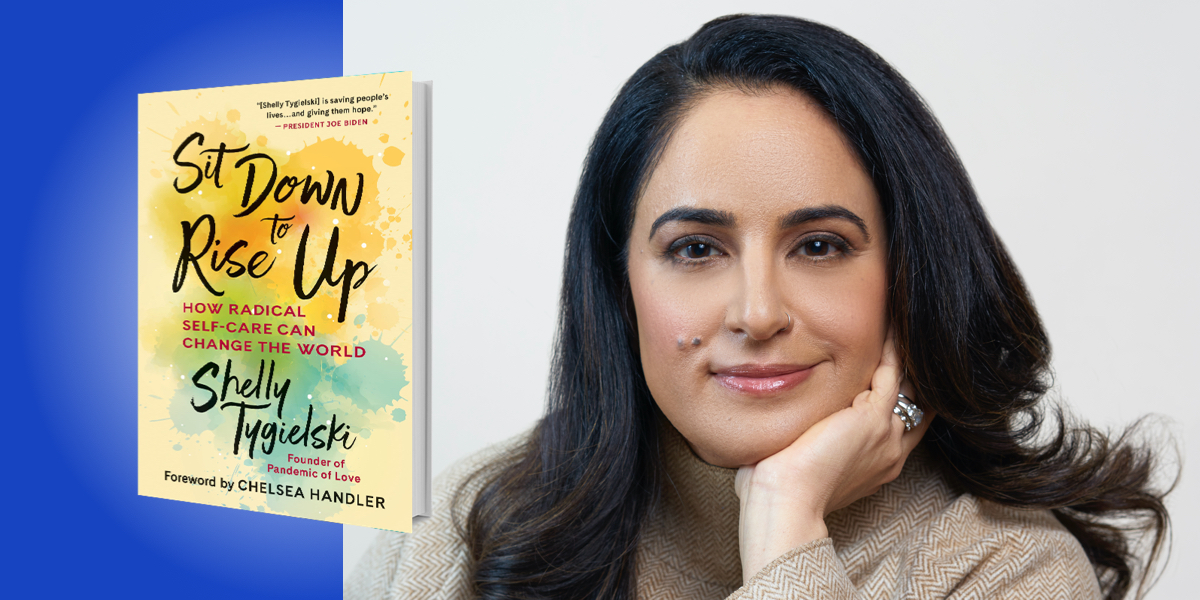Shelly Tygielski is a self-care activist and community organizer. She founded a global, grassroots, mutual aid organization, Pandemic of Love. Her first book is all about how to respond to stress in a way that stimulates growth.
Below, Shelly shares 5 key insights from her new book, Sit Down to Rise Up: How Radical Self-Care Can Change the World. Listen to the audio version—read by Shelly herself—in the Next Big Idea App.
1. Self-care is not an individualistic pursuit.
Self-care is often considered self-centered and selfish—it can imply caring that extends only to ourselves as individuals. But we can expand our definition of “self” to extend beyond the individual to include our family, community, the natural world, and all sentient beings. Self-care actually means caring for your entire community; it encompasses and protects this larger order.
In a way, self-care means living and working in ways that model how we want the world to work. And the best version of the world starts with the best version of ourselves. Therefore, even if the word “self” in “self-care” implies an individualistic approach, in order for it to work and for us to be at our best, we must take a communal approach. When the people in our circle of influence and community are well, healthy, and have their basic needs met, the collective can thrive.
“The best version of the world starts with the best version of ourselves.”
2. Big problems don’t always require big solutions.
The problems in the world are daunting and can make us feel paralyzed, thinking: “I’m just one person—what can I do?” Most people believe they need to have a big, lofty plan to make a difference, but that couldn’t be further from the truth. Huge impacts are an aggregate of many small actions. For example, when I started the now global, award-winning mutual aid organization Pandemic of Love, I launched it as one person seeking to help the people in my local community. I sat in despair around my kitchen table in March of 2020, worrying about the people around me who I knew would not be able to get through the lockdowns, people who were already struggling before the pandemic hit.
My idea was simple. I created two forms: one to “Give Help” and one to “Get Help,” so that people in need could be matched with someone who could fulfill that need directly. Within fourteen months, Pandemic of Love matched nearly two million people who directly transacted close to sixty million dollars. Sixty million dollars is a lot of money, but that’s coming from a lot of people doing a little bit to make a huge impact. The average transaction for Pandemic of Love was one hundred and thirty-five dollars.
As the Buddhist proverb rightly suggests, “If we all just tend to the areas of the garden that we can touch,” and we solely focused on that, the world’s proverbial gardens would be growing and blossoming. The point is, don’t let a big problem intimidate you from trying to find a solution. Focus on what you can do—the area of the garden you can touch. You’ll be surprised by how far the influence can extend.
“Most people believe they need to have a big, lofty plan to make a difference, but that couldn’t be further from the truth.”
3. Enough is a feast.
“Enough is as good as a feast” is an idiom that first appeared in print in the year 1660, written by James Howell, in an English-French-Italian-Spanish dictionary titled Lexicon Tetraglotton. The only explanation to accompany its entry is that it is an English proverb, suggesting that the proverb was already well-known by this time.
To understand the idea behind this idiom, imagine that you are starving from a lack of food. It would be easy to want a feast. However, there is no real advantage to having more than enough as compared to just enough. You gain nothing by having too much to eat. People typically use this expression as a call for moderation or a caution against gluttony or excess, and this proverb can clearly extend to contexts outside of food.
There is a mindset shift that comes with this proverb. In the standard consumer mindset of the Western world, there is no end to newer, better, and more. But when we stop the consumption, even briefly, we realize that we can change our deeply ingrained habits and thought patterns. We begin to focus on cultivating an abundance of non-material things: joy, peace, and gratitude.
However, in the midst of shedding excess, it becomes harder and harder to maintain things like happiness, because we bear witness to people in our community who are suffering and do not have enough. Our excess contributes to their “enough.” So, live with the mindset that enough is the most we need. This contributes to equity in the world. It’s our responsibility to ensure that everyone in our circle of influence has enough.
“In the standard consumer mindset of the Western world, there is no end to newer, better, and more.”
4. If you want to be happy and fulfilled, center your life around intentions, not goals.
When we were young, adults always asked us, “What do you want to be when you grow up?” That is a goal-oriented question, and it leads to a goal-oriented response. It makes it seem that what we are is most important—whether that’s a cowboy, princess, doctor, or lawyer—and I think this question should be retired. I think it leads to stifled, self-defeating fears that keep us from showing up as adults.
Instead, we should ask ourselves, “Who do you want to be when you grow up? What kind of person? Someone who is compassionate, helpful, loving, in service?” This question elicits a response that focuses on our intentions, rather than on what we might achieve in any material way, or what title we pursue.
It can be easy to confuse intentions with goals, since sometimes we use the same language for both. For instance, someone could say, “My intention is to be happy,” but this turns happiness into a goal or something to achieve. As we all know, wanting to be happy does not make us happier. If anything, this can leave us more frustrated, because many days we won’t achieve happiness, no matter how hard we try. However, if we say, “My intention is to act with kindness,” then what matters is our effort and how we act, not the result.
“We can be kind in any circumstance, even in the most mundane aspects of our lives.”
Further, we always have the power to choose how to act, and we can be kind in any circumstance, even in the most mundane aspects of our lives. If we do this each day, little by little, that intention to be kind will become part of the fabric of who we are, allowing us to anchor ourselves in unwavering intentions.
5. The secret to life is to show up for yourself and for others.
Show up physically to create sacred spaces. Show up consistently. Show up even when others don’t show up. Show up in a way that makes every person feel held. Show up in a way that makes you feel held by others. Why? Because destiny isn’t determined by chance alone; it is also a choice.
Consistently showing up means creating opportunities for being in the right place at the right time, especially for opportunities that align with our values. Showing up means creating the possibility for fully experiencing life in the present moment, and feeling that presence deep in our mind, body, and spirit. Ultimately, consistently showing up for ourselves lays the foundation for what is truly life’s purpose: showing up for others.
To listen to the audio version read by author Shelly Tygielski, download the Next Big Idea App today:































